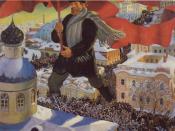The revolutionary movements in Russia all exhibit common themes that define its ultimate path toward the Revolution of 1917. Yarmolinsky, Zelnik, and Fitzpatrick present complementing views on Russia's revolutionary path. The failures of the Populists to foment a revolution amongst the rural peasants fostered a series of new and antagonistic interpretations on how Russia would achieve reform. Various theoretical groups sought new ideas to accomplish necessary reform, but no other group than the Marxists attracted a significant following. The Marxists theorized that revolutionary reform could only come from a bourgeois rejection of autocracy, and then a proletarian revolution against bourgeois capitalism. After the Revolution of 1905, the Marxists experienced a split between two groups that called themselves either Bolshevik or Menshevik. Their differences in ideology contributed to the paradoxical development and procrastination of revolutionary action after 1905 up until 1917.
All three historians agree that the rural peasants were not the driving force behind the revolutions of 1905 and 1917.
As Yarmolinksy claims, the Populists failed in achieving significant revolutionary reform, because they did not truly understand the peasants and had no direction. Further adding to the failure of the Populist crusade was the lack of organization amongst the propagandist groups. On the other hand, a revolutionary group such as the Bolsheviks stressed the importance of a tight-knit party under a centralized leadership - an essential component in advancing the proletarian revolution. A supporter of Lenin's ideology, Carr would agree with Yarmolinsky on the failures of the Populists in terms of their lack of centralized leadership. Furthermore, Carr agrees that the rural peasants, although initially a part of the revolutionary process, were not the true driving force for revolution; it was the urban worker that provided the necessary enthusiasm to complete the Marxist revolutionary evolution scheme. Fitzpatrick also substantiates...


